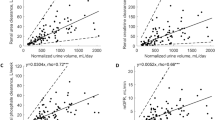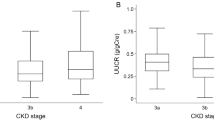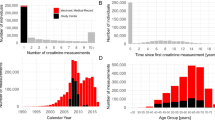Abstract
In 1926 Rehberg1 suggested that the function of a kidney might be measured by the extent to which intravenously administered creatinine could be concentrated during the elaboration of the urine. He also claimed that the creatinine clearance measured quantitatively the glomerular filtrate.
This is a preview of subscription content, access via your institution
Access options
Subscribe to this journal
Receive 51 print issues and online access
$199.00 per year
only $3.90 per issue
Buy this article
- Purchase on SpringerLink
- Instant access to the full article PDF.
USD 39.95
Prices may be subject to local taxes which are calculated during checkout
Similar content being viewed by others
References
Rehberg, P. B., Biochem. J., 20, 447 (1926).
Smith, H. W., "Physiology of the Kidney" (Oxford Medical Publications, London, 1937).
Barclay, J. A., and Kenney, R. A., Biochem. J., in the press.
Barclay, J. A., and Cooke, W. T., Nature, 154, 85 (1944).
Barclay, J. A., Cooke, W. T., and Kenney, R. A., Acta Medica Scandinavica, in the press.
Barclay, J. A., and Kenney, R. A., Acta Medica Scandinavica, 125, 385 (1946).
Author information
Authors and Affiliations
Rights and permissions
About this article
Cite this article
BARCLAY, J., KENNEY, R. & COOKE, W. ‘Water Excretory Threshold’ as a Measure of Kidney Efficiency. Nature 160, 432–433 (1947). https://doi.org/10.1038/160432b0
Issue date:
DOI: https://doi.org/10.1038/160432b0



